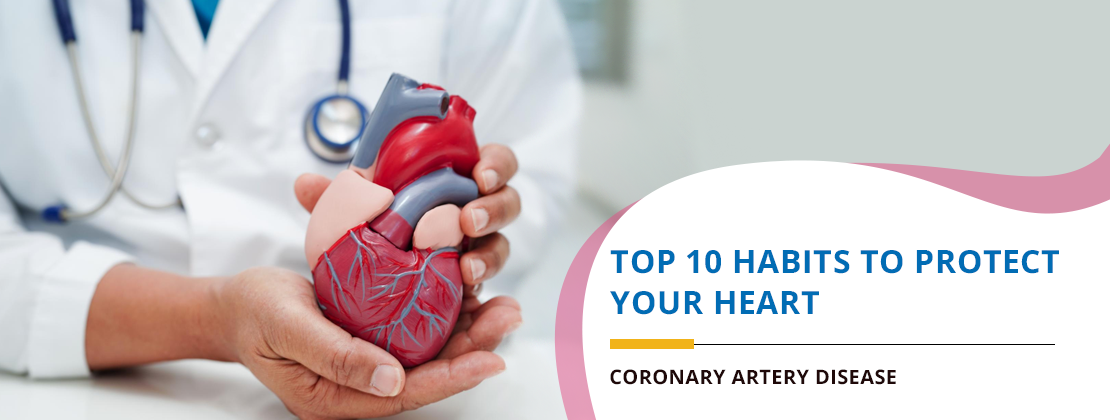
Home / Blog / Top 10 Habits to Protect Your Heart from Coronary Artery Disease
April 16, 2025
Your heart pumps blood to various parts of the body; in other words, it is like an engine.
By beating more than 100,000 times each day, your heart makes sure that every cell in your body gets oxygen and the necessary nutrients.
Now comes the important question: “How are you taking care of your heart?”
Cardiovascular diseases cause the highest number of deaths in India. Coronary artery disease, a type of cardiovascular disease, is one of the biggest health concerns in our country.
CAD cases, which are a result of poor lifestyle habits, have been on the rise for many years now. When fatty deposits accumulate in the blood vessels that supply blood to the cardiac muscles, there is reduced flow of blood to the heart, which may cause a heart attack.
Most CAD cases can be prevented by making small adjustments to one’s way of life and adhering to them. By taking immediate steps and adopting appropriate plans, it is possible to enhance your cardiac health considerably and decrease the chances of severe problems.
This blog outlines the top 10 habits that help prevent heart disease, specifically targeting ways to protect your heart from coronary artery disease.

Most individuals do not know that they have heart problems until they suffer a heart attack or something similar.
Coronary artery disease symptoms usually progress over a long period and can remain invisible for many years. Some common symptoms may be identified as angina, difficulty in breathing, or tiredness, especially after exercising; however, people often think that these are just signs of stress or getting old.
Establishing good practices can help you significantly reduce the risk of various heart diseases. Like with any other disease, prevention is better than cure when it comes to heart diseases.
Here are ten science-backed habits that can protect your heart and promote long-term cardiac health:
The food you eat directly impacts your heart health.
A heart-healthy diet is rich in whole grains, fruits, vegetables, legumes, lean proteins, and healthy fats like those found in olive oil and nuts.
Avoid processed foods, excessive sugar, and trans fats, which contribute to plaque buildup in your arteries. Limiting sodium also helps reduce blood pressure, an essential step in heart disease prevention.
Taking up this diet can help lower inflammation, decrease bad cholesterol, increase good cholesterol, and maintain blood sugar, thus preventing heart disease.
Additional Reading: Understanding Cholesterol and Its Role in Coronary Artery Disease – HCG Hospitals
Physical activity strengthens the heart muscle, improves blood flow, and reduces stress. Aim for at least 150 minutes of moderate aerobic exercise weekly—like walking, swimming, or cycling. Exercise also helps manage weight, lower cholesterol, and improve insulin sensitivity.
Regular exercise significantly contributes to heart attack prevention and improves overall cardiac health, making it one of the most effective ways to fight off coronary artery disease.

Smoking is one of the most dangerous habits for your heart. It damages the arteries, accelerates plaque buildup, and decreases oxygen in the blood. Even secondhand smoke exposure increases the risk of coronary artery disease.
Quitting smoking immediately begins to reduce your risk. Within a year, your heart attack risk drops dramatically. This habit is a cornerstone of heart disease prevention.
Carrying excess weight—especially around your abdomen—increases your chances of developing high blood pressure, high cholesterol, and type 2 diabetes. These conditions are major risk factors for coronary artery disease.
Losing even a small amount of weight can positively impact your heart health. Maintaining a healthy body mass index (BMI) through diet and exercise is a long-term commitment to prevent heart disease.
Stress doesn’t just affect your mind—it impacts your body, too. Chronic stress can lead to poor choices like smoking, overeating, or drinking alcohol excessively. It also causes spikes in blood pressure and increases inflammation, putting extra strain on the heart.
Techniques such as meditation, deep breathing, journaling, or simply taking breaks for hobbies and social interaction can help manage stress. Long-term stress reduction is crucial for improving cardiac health.
Poor sleep patterns are associated with obesity, high blood pressure, and insulin resistance—conditions that increase the risk of coronary artery disease. Adults should aim for 7–9 hours of quality sleep every night.
Sleep allows the body to regulate stress hormones, blood sugar, and inflammation. Prioritising rest is a simple yet powerful habit in your heart disease prevention toolkit.
While moderate alcohol consumption may have some cardiovascular benefits, excessive intake is harmful. It can raise blood pressure, lead to weight gain, and cause irregular heartbeats.
Stick to recommended guidelines—not more than one drink per day for women and two for men. Reducing alcohol intake supports heart attack prevention and protects long-term heart health.
High blood pressure and high cholesterol are often called “silent killers” because they rarely cause symptoms until damage has already occurred. Both are leading contributors to coronary artery disease.
Regular health screenings are essential. If you’re at risk, track your numbers and make lifestyle changes or take medications as prescribed. Keeping these levels in check is one of the best ways to prevent heart disease.
Explore cardiac health checkups at HCG Hospitals: Health Package Archive – HCG Hospitals
Diabetes significantly increases the risk of coronary artery disease. High blood sugar damages blood vessels and nerves that control the heart, leading to serious complications.
Whether you have diabetes or are at risk, managing blood sugar through a balanced diet, exercise, and medication (if necessary) helps protect your cardiac health and supports heart attack prevention.

Hydration plays a key role in heart health. Water helps regulate blood pressure and supports overall circulation. Sugary beverages, on the other hand, spike insulin levels and contribute to obesity and diabetes.
Replace sodas and sweetened drinks with water, herbal teas, or natural juices. This small change can go a long way in your efforts to prevent heart disease.
Your heart is in your hands—literally and figuratively. By embracing these healthy heart tips, you’re not only reducing your risk of coronary artery disease but also investing in a healthier, longer life. Prevention doesn’t require drastic changes; it starts with simple, consistent steps taken every day.
Learning about different coronary artery disease symptoms is imperative; however, what’s more essential is to take appropriate measures to reduce the overall risk of this condition. Don’t wait for a warning sign. Begin incorporating these habits today to strengthen your cardiac health and build a future free from heart disease.
For any queries related to coronary artery disease or its management, please reach out to HCG, one of the leading multispeciality hospitals in India.